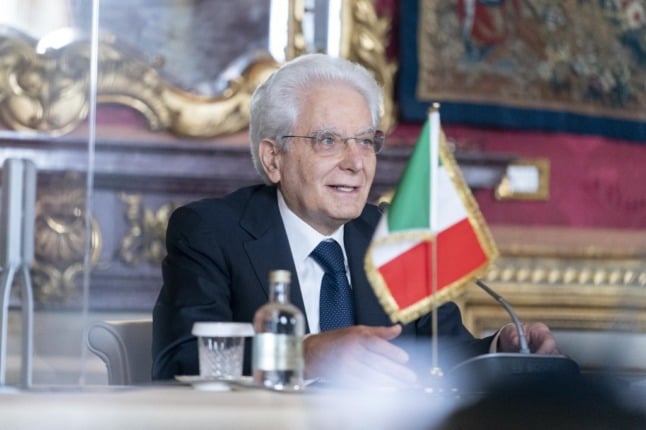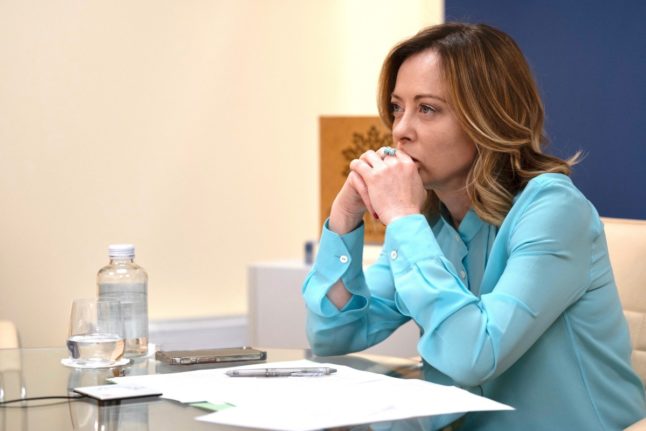The 80-year-old Sicilian has already been a unifying figure through five different governments and the devastation of the coronavirus pandemic. He had not counted on having to do it all again.
A little-known constitutional court judge when he was elected head of state by parliament in 2015, soft-spoken Mattarella has inspired respect and affection across the political sphere.
But president was a gig he only wanted once.
After Italy’s bickering political parties failed to agree on a candidate for his successor, and the threat of snap elections reared its head, Mattarella finally agreed Saturday to stay on.
His second mandate will be tricky from the start, amid fears infighting within the ruling national unity government will only worsen ahead of next year’s general election.
READ ALSO: Italy averts political chaos as President Sergio Mattarella re-elected
‘A little reluctant’
Over his previous 25-year parliamentary career, Mattarella had avoided the limelight. He was known mostly for his brother’s murder by the mafia, and for his stand against media tycoon and former prime minister Silvio Berlusconi.
At the Quirinale presidential palace, he navigated the resignation of his first prime minister Matteo Renzi, his replacement by Paolo Gentiloni, and the advent of an anti-European populist government in 2018.
When the subsequent coalition collapsed in early 2021, it was Mattarella who brought in former European Central Bank chief Mario Draghi at the head of a left-right government to manage the fallout of the pandemic.
For his first mandate, Mattarella “arrived at the Quirinale a little reluctantly, not particularly prepared and without a real desire to be president”, said Giacomo Marramao, professor of theoretical philosophy at Rome’s Roma Tre university.
“But he has gradually come to terms with his role in the best possible way and he has been, and remains, a protector of the constitution,” he told AFP.
Family tragedy
Born on July 23, 1941, the son of one of Sicily’s most prominent and influential Christian Democrats, Mattarella spent his early career teaching law at Palermo university.
In 1980, tragedy struck the family when his elder brother Piersanti was murdered by the Cosa Nostra, Sicily’s notorious crime syndicate.
Piersanti had followed his father into politics and was the island’s regional president, determined to disrupt the myriad links between his centre-right party and organised crime.
As he set off for an Epiphany mass on January 6th, 1980, he was shot by a gunman as he got into his car.
Mattarella was one of the first on the scene, and cradled his brother as he died on their way to hospital.
For the rest of the day, he received people coming to pay their respects in a shirt still stained with his brother’s blood. It was, in effect, his debut in the public eye.
Three years later, Mattarella entered parliament.
Without seeking the limelight, but with a reputation for competence and integrity, he forged a successful career as a minister, first in a series of Christian Democrat-led coalitions.
READ ALSO: EXPLAINED: How do Italy’s presidential elections work?
Always on the left of the party, Mattarella took a stand against the right in 1990, when he was one of five ministers who resigned in protest over a new media law that critics said had been tailor-made to suit Berlusconi’s television interests.
‘Man of the law’
Mattarella is naturally reserved and a devout Catholic, but beneath his calm manner he “has very firm principles”, said Lina Palmerini, a journalist who follows the presidency.
He has recently been outspoken in urging Italians to ensure they are vaccinated against coronavirus.
In 2015, then Democratic Party premier Renzi put him forward for the presidency as “a man of the law, a man of the battle against the mafia”.
A constitutional expert, Mattarella had authored an electoral law that bears his name, aimed at bringing some stability to Italy’s turbulent politics, although it was replaced a decade later.
He was also defence minister when military service was abolished.
He quit politics in 2008 and three years later was elected a judge on Italy’s constitutional court.
Mattarella has three children by his wife Marisa Chiazzese, who died from cancer in 2012



 Please whitelist us to continue reading.
Please whitelist us to continue reading.
Best of luck to Mattarella, hope he can steady the ship of state.